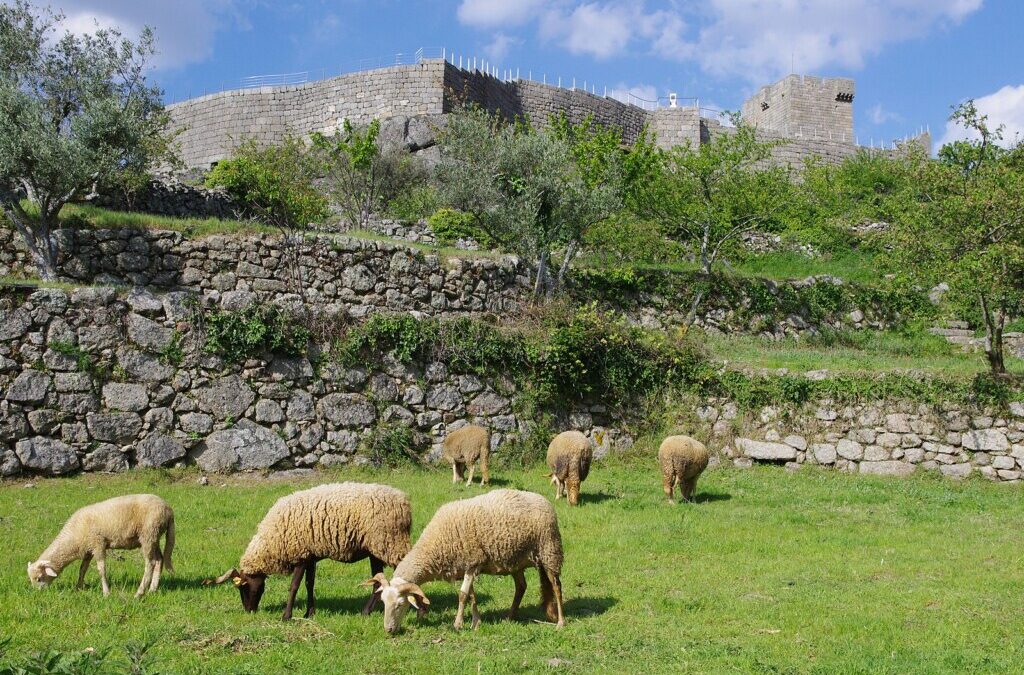Every once in a while, a great and mysterious urge comes over me to watch Tudor Monastery Farm.
For those of you who aren’t familiar with this BBC classic, I’m referring to the six-part reality/documentary series in which two archaeologists and a historian live out the lifestyles of farmers during the Tudor period in England. Each episode covers a different stage of the year and its associated tasks and holidays—plowing a field, making candles, smelting lead—they do it all. It features such memorable lines of dialogue as: “All alchemists wrote in code” and “I want to stress: I did not drop the custard castle.” Time Out’s Danielle Goldstein gave the show three out of five stars and called it “intriguing.”
I know—incredible.
This show has taught me where the word “cupboard” came from, how to steam and bend planks of wood, and how to sell wool to a monastery. Everyone is wearing period clothing and making cheesy jokes and I love it. These people are so unselfconsciously jazzed about how the Tudors designed their cheese-making rooms (on the north facing side so that the main building shields it from the heat of the sun with windows placed to create a through draft and an unglazed, porous tile floor so that a bucket’s worth of water poured over it can gradually evaporate, be swept out by said through draft, and regulate the temperature of the room, thereby making cheese) it’s inspiring.
When I tell my friends about this show they are not surprised that I’m into it. I do tend to get very excited about niche and archaic things, in part because of the things themselves—the beauty of the finished product or the skill it takes to get there. But also because of the shaken-fist-in-the-face-of-progress that is the dedication of people who have continued to practice these things.
Each episode features few experts on the crafts being covered, such as the man somewhat forlornly described by the narrator as the “one professional wooden dish maker left in Britain.” As fascinated as I am by the details of life covered in the show, I’m left wanting to know more about the people who still practice them. What’s their story? How does one get into bowl-making? Is that their primary source of income?
I mean, look at this guy teaching one of the hosts how to make brandy:
The beauty. The dignity. The dedication. I want to be your friend, sir.
In many ways, no one should do these things. They are not practical and, in some cases, pretty dangerous. And yet, I find myself shouting to the ceiling, “THAT’S SO COOL.” I want these people and their skills to live forever.
Sure, in some cases, people will pay more for the artisanal, handmade, or traditional. But what about the things that aren’t more valuable to do by hand (i.e. most of the farming)? What is the purpose of keeping alive these traditions, some of which didn’t even last that long in the grand scheme of things? Why do I find it so beautiful that someone still knows how to make a particular kind of tile that went out of fashion in the 1540s?
Is there beauty inherent in taking the long way to get somewhere? And if there is beauty does that mean there’s always value? We could spend quite a few words on those questions.
I could ruminate on what about these lifestyles and trades are so appealing to me, whether a life so consumed with archaic tasks has meaning or purpose, or put another way, if a life that brings satisfaction is always meaningful—supply and demand be damned.
But mostly I just want to enjoy telling you all about this show and how brilliant humans can be (it’s on Amazon Prime, by the way). I like it. It makes me smile. And be increasingly in awe of the people who lived here before us.
(But also, if anyone does know a mason or Tudor-style bellmaker in need of an apprentice to pass on a dying craft, do let me know).

Christina Ribbens (’19) graduated with a major in history and minors in studio art and data science. After working in campus ministry for a few years, she’s getting her master’s in public humanities at Georgetown University in Washington, DC. She has a benevolent dependency on tea, is always down for a game of pick-up basketball, and would love to have you over for pancakes sometime.











This show sounds utterly delightful. Thanks for the tip-off!
Wonderful. I am inspired to find some way to shake-my-fist-in-the-face-of-progress today. Thank you.